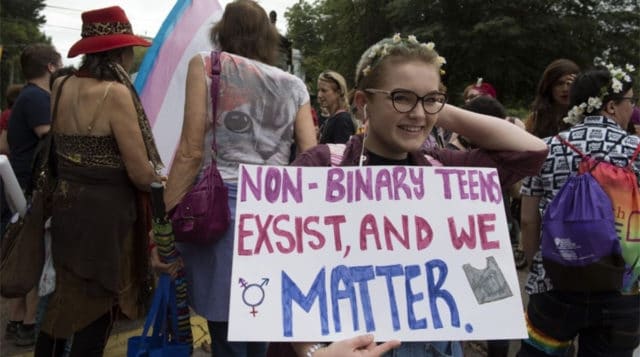
Being a parent has always been a difficult job. Staying involved with school, chauffeuring to various extracurricular activities, and putting food on the table, all while trying to maintain a general atmosphere of love, support, and growth for your child. It can be more than a little complicated. Life can get even trickier if you’re unprepared when your teen comes out to you as non-binary.
The initial flood of questions and concerns you have as a parent might be overwhelming, but your teen coming out to you as non-binary isn’t an occasion for panic, and definitely not a sign that anything is “wrong” with your teen. If anything, it’s a sign of immense trust from your teen and opportunity to grow closer.
In this article I hope to assuage several fears, concerns, and questions you might have as a parent, as well as suggest possible approaches to obstacles non-binary teens and their parents often face.
First, what does non-binary mean?
There is a vast lexicon associated with the LGBTQ community that might be intimidating to people unfamiliar with the growing spectrum of gender identities and sexual orientations. But the most important term to understand when defining non-binary is the word gender.
Most simply put, a person’s gender is their understanding of how they fit into the standard depictions of “man” and “woman.” It is different than sex, which typically refers to a person’s biological assignment at birth (male or female). A person’s gender may impact the way they dress, who they date, and what they choose to be called by other people. For example, someone who is biologically female may identify as a man by wearing men’s suits, going by the name “Chris” instead of “Christina,” and asking to be referred to as “he” instead of “her.”
What does this mean for your child? Ultimately, your teen telling you they are non-binary means that they feel they do not fit into the binary gender categories of “man” and “woman.”
It does not necessarily mean your teen is transgender (a transgender person’s gender identity does not match their assigned biological sex), and says nothing about their sexual orientation. However, these may be conversations you would like to have with your teen to further understand their sexual and gender identities.
Could my teen just be confused, or following a trend?
Although gender is a complicated subject, the answer is almost certainly no. Research shows that people already begin forming their gender identities between the ages of 3 and 5, and that non-binary people have existed across many cultures throughout all of history. Discounting your teen’s gender identity by treating them as confused or rebellious can make them feel isolated and like they have no space to be themself, which could lead to mental health issues like depression and anxiety.
It’s important to understand that being non-binary is not a sign of mental illness, or a mental illness in itself. However, your non-binary teen will likely experience moments of inadvertent discrimination that make them feel isolated, unheard, and stressed. Concealing these feelings can lead to serious mental health issues as well as an increased chance of engaging in risky behaviors. It is vital that your teen feels safe, heard, and supported by you, their family, and their friends, and that they can look to you for communication and support.
What can I do as a parent?
Gender is incredibly personal, and everyone must discover their gender individually. It’s not your responsibility to help them “decide” on a gender or to make a show of their non-conformity. Your teen should lead the way on their gender identity, with you as a supportive follower.
First and foremost, it’s vital that you make sure your teen feels comfortable speaking to you about being non-binary. You might want to start by instigating conversations with your teen to help you understand their non-binary identity. If you’re confused, maybe say something like:
“Hey, Dina. Thank you for telling me that you’re non-binary. I appreciate your trust and want you to know that I want us to be able to talk about this openly. I’m sorry if I’m not totally sure what non-binary means. It’s not that I don’t believe you, and I’m not upset, but can you help me understand so I can be more supportive?”
A conversation like this could spur your teen into an explanation of what non-binary means to them, as well as establish an avenue of communication between you and your teen about their experiences with gender and sexual identity.
Anything else?
It’s true that society is not always accepting of non-binary people. Your teen may deal with various forms of bullying due to their gender identity, and as a parent you may find yourself in awkward situations when it comes to filling out registrations or dealing with other parents and teens.
Fortunately, there are ways to lessen these unpleasant interactions. If your teen is ok with it, you can approach their teachers and administrators at school to notify them of your teen’s identity. You can also search for TGNC (transgender and non-conforming)-friendly businesses that cater to non-binary people, or find groups or clubs for your teen to join with other non-binary people.
Gender counselors also exist to help people along in their journeys with gender identity. While there’s expanding resources today to help make life more manageable for non-binary people, it’s important to remember that no parent can make life perfect for their teen. We think your primary role as the parent of a non-binary teen is to foster openness, understanding, and communication.
Your teen has realized they are non-binary, and this is nothing to fret over. Yes, there will be changes. But with the right support from you as a parent, they can grow into their gender identity confidently, and you and your teen can grow closer in the process.
Author’s bio:
Eric M. Earle is the founder of Tutor Portland and Tutor San Francisco. He focuses on improving students’ math grades to better their college acceptance rates.







